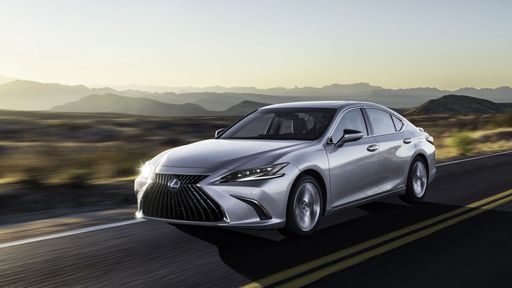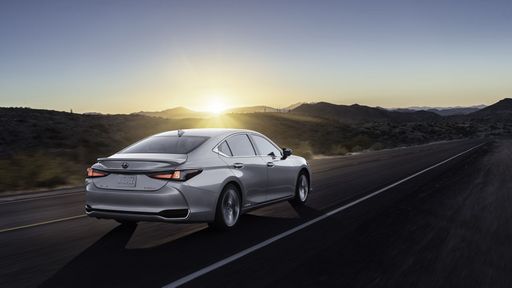Hyundai Kona vs Lexus ES - Differences and prices compared
Compare performance (218 HP vs 218 HP), boot space and price (23100 £ vs 46600 £ ) at a glance. Find out which car is the better choice for you – Hyundai Kona or Lexus ES?
Costs and Efficiency:
Price and efficiency are key factors when choosing a car – and this is often where the real differences emerge.
Hyundai Kona has a decisively advantage in terms of price – it starts at 23100 £ , while the Lexus ES costs 46600 £ . That’s a price difference of around 23528 £.
Fuel consumption also shows a difference: Hyundai Kona manages with 4.60 L and is therefore to a small extent more efficient than the Lexus ES with 5.10 L. The difference is about 0.50 L per 100 km.
Engine and Performance:
Power, torque and acceleration say a lot about how a car feels on the road. This is where you see which model delivers more driving dynamics.
Both models deliver identical power – 218 HP each.
In acceleration from 0 to 100 km/h, the Hyundai Kona is slightly quicker – completing the sprint in 7.80 s, while the Lexus ES takes 8.90 s. That’s about 1.10 s faster.
In terms of top speed, the Hyundai Kona performs slightly better – reaching 210 km/h, while the Lexus ES tops out at 180 km/h. The difference is around 30 km/h.
Space and Everyday Use:
Whether family car or daily driver – which one offers more room, flexibility and comfort?
Both vehicles offer seating for 5 people.
In curb weight, Hyundai Kona is clearly perceptible lighter – 1370 kg compared to 1680 kg. The difference is around 310 kg.
In terms of boot space, the Hyundai Kona offers hardly perceptible more room – 466 L compared to 454 L. That’s a difference of about 12 L.
When it comes to payload, Hyundai Kona slight takes the win – 490 kg compared to 470 kg. That’s a difference of about 20 kg.
Who comes out on top?
Overall, the Hyundai Kona shows itself to be dominates this comparison and secures the title of DriveDuel Champion.
It convinces with the more balanced overall package and proves to be the more versatile choice for everyday use.

Hyundai Kona
Costs and Consumption
View detailed analysis
Engine and Performance
View detailed analysis
Dimensions and Body
View detailed analysis
Hyundai Kona
The Hyundai Kona wears its personality on the outside with bold styling and sprightly handling that turns city driving into something a little more fun than a commute. It blends practical space, modern tech and sensible running costs into a compact, stylish package — a smart pick if you want flair without paying luxury prices.
details



Lexus ES
The Lexus ES delivers a supremely comfortable, quietly luxurious experience that favors serene cruising over sporting theatrics. It wraps everyday practicality, top-notch build quality and unimpeachable reliability in a handsome, grown-up package that will appeal to buyers who prize calm refinement over headline-grabbing excitement.
details


Costs and Consumption |
|
|---|---|
|
Price
23100 - 41600 £
|
Price
46600 - 59300 £
|
|
Consumption L/100km
4.6 - 7 L
|
Consumption L/100km
5.10 L
|
|
Consumption kWh/100km
14.6 - 16.8 kWh
|
Consumption kWh/100km
-
|
|
Electric Range
377 - 514 km
|
Electric Range
-
|
|
Battery Capacity
1.3 - 65.4 kWh
|
Battery Capacity
-
|
|
co2
0 - 163 g/km
|
co2
115 g/km
|
|
Fuel tank capacity
38 - 47 L
|
Fuel tank capacity
50 L
|
Dimensions and Body |
|
|---|---|
|
Body Type
SUV
|
Body Type
Sedan
|
|
Seats
5
|
Seats
5
|
|
Doors
5
|
Doors
4
|
|
Curb weight
1370 - 1773 kg
|
Curb weight
1680 kg
|
|
Trunk capacity
466 L
|
Trunk capacity
454 L
|
|
Length
4350 - 4385 mm
|
Length
4975 mm
|
|
Width
1825 mm
|
Width
1865 mm
|
|
Height
1580 - 1585 mm
|
Height
1445 mm
|
|
Max trunk capacity
1300 L
|
Max trunk capacity
-
|
|
Payload
420 - 490 kg
|
Payload
470 kg
|
Engine and Performance |
|
|---|---|
|
Engine Type
Electric, Petrol, Full Hybrid
|
Engine Type
Full Hybrid
|
|
Transmission
Automatic, Manuel
|
Transmission
Automatic
|
|
Transmission Detail
Reduction Gearbox, Manual Gearbox, Dual-Clutch Automatic
|
Transmission Detail
CVT
|
|
Drive Type
Front-Wheel Drive, All-Wheel Drive
|
Drive Type
Front-Wheel Drive
|
|
Power HP
115 - 218 HP
|
Power HP
218 HP
|
|
Acceleration 0-100km/h
7.8 - 11.9 s
|
Acceleration 0-100km/h
8.90 s
|
|
Max Speed
162 - 210 km/h
|
Max Speed
180 km/h
|
|
Torque
200 - 265 Nm
|
Torque
-
|
|
Number of Cylinders
3 - 4
|
Number of Cylinders
4
|
|
Power kW
85 - 160 kW
|
Power kW
160 kW
|
|
Engine capacity
998 - 1598 cm3
|
Engine capacity
2487 cm3
|
General |
|
|---|---|
|
Model Year
2024 - 2025
|
Model Year
2024
|
|
CO2 Efficiency Class
A, D, C, E, F
|
CO2 Efficiency Class
C
|
|
Brand
Hyundai
|
Brand
Lexus
|
Is the Hyundai Kona offered with different drivetrains?
Available configurations include Front-Wheel Drive or All-Wheel Drive.




